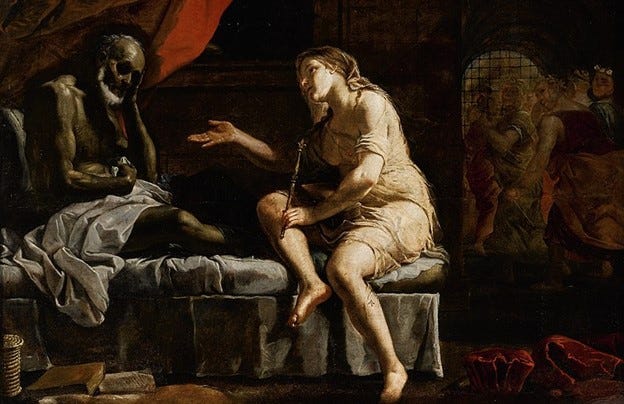The Consolation of Complexity: From Boethius to Behe
Perception of order in the natural world encourages a recognition of Providence in human affairs

My wife and I recently enjoyed a painstaking drive from Florida to Ohio. Whenever we go on a road trip, we try to find some sort of audiobook or podcast to pass the time. For this outing, we chose Michael Behe’s (1996) Darwin’s Black Box.
Despite still having a few hours left in the book to listen to, the contents of this book were so provocative that I felt the need to write about it.
I couldn’t help but notice that upon further reflection, Behe’s scientific arguments about perceiving order in the natural world intersect nicely with Boethius’ Consolation of Philosophy. Back in the day, people used to call science by the name of “natural philosophy.” Thus, this post is about the consolation we get from Behe’s natural philosophy.
Boethius and the Natural Order

Boethius, a former Roman consul, was falsely accused of treason against the king in 523. While under house arrest, he composed The Consolation of Philosophy. In Book I, Boethius laments his situation and discourses with Lady Philosophy, who seeks to diagnose his “illness.” Boethius has been reading some poetry, and it has made him particularly weepy. Lady Philosophy wants to snap him out of his self-pity.
So, she asks Boethius, who is on the verge of despair, whether or not he perceives order in the natural world. Failing to see any sort of order in creation, he is a lost cause. Thus, she says to him:
Forgetting who you are has made you confused, and this is why you are upset at being both exiled and stripped of your possessions. Then, since you are unaware of the goal to which creation proceeds, you imagine that wicked and unprincipled individuals are powerful and blessed. Moreover, since you have forgotten the reins that control the world, you believe that the changes of fortune which have befallen you are random and unguided. These are serious symptoms, which bring on not only sickness, but also death. But thanks be to the source of health, for nature has not wholly forsaken you; your true conviction of the government of the world provides us with the nourishment to restore you to health, for you believe that the universe is guided by divine reason, and is not subject to random chance. So have no fear; this tiniest of sparks will cause life's heat to be resuscitated in you.
By “death,” Lady Philosophy clearly means spiritual death. He needs to see (and trust) that everything has a purpose, both in natural and human affairs.
Lady Philosophy wants to build upon Boethius’ perception of order in the natural world to lead him to perceive order in everything. In other words, she wants to use his recognition of an ordered cosmos to move him to a recognition of Divine Providence.
Undoubtedly, our perception of Divine Providence can be severely disturbed by our failure to recognize design in nature. However, if you can begin to see nature as ordered by divine reason, then this tiny spark can “cause life’s heat to be resuscitated in you.”
The Root of Behe’s Argument

The question is whether such design in nature exists at all. For the pure evolutionist, random chance has put only the semblance of design into the world around us. There’s order, to be sure. But nobody designed it.
At the local scale (on an island in the Galapagos, for example), different birds have differently shaped beaks that allow them to better adapt to the environment. So, too, moths take on the color of their environment to better avoid predators. As per Darwin, these new beaks and differently colored skins emerge as the result of random mutation over time, predisposing creatures with these new features to better survive in the environment. The randomly mutated and better adapted survive. The others die off. This is the essence of natural selection.
Behe doesn’t deny that such adaptation occurs at the local level. What he takes issue with (and what the book aims to refute) is the gradual evolution of complex biological systems. Per Darwin, evolution must proceed in a gradual, stepwise manner, otherwise it is doomed. Darwin writes,
If it could be demonstrated that any complex organ existed which could not possibly have been formed by numerous, successive, slight modifications, my theory would absolutely break down. (Origin of the Species, p. 195)
Enter Michael Behe. Behe’s primary metaphor is that of a mouse trap, which requires several constituent parts in order to fulfill its function of catching mice: a platform, catch, spring, hammer holding bar, and holding bar curl. Lacking any one of these components, the mousetrap cannot fulfill its function of catching mice.

Similarly, biological phenomena like the cilium (a hairlike structure that can propel a cell) or the blood clotting mechanism require an extraordinary variety of components to function. If they lacked just one, they’d fail. Without the spring, catch, or platform, the mouse trap wouldn’t work. Without this, that, or the other protein in a long, complex chain of proteins, you would bleed to death.
The crux of Behe’s argument is as follows. These constituent components could not evolve stepwise, one after the other. Why? Because each constituent component in and of itself would provide no biological advantage. The platform by itself cannot catch a mouse. Neither does the spring by itself constitute an advantage. The advantage only comes when all the constituent parts are assembled together, thus allowing the system to fulfill its function (in this case, of catching mice).
You need all the parts there at the same time in order for a biological advantage to be present. The system itself is thus “irreducibly complex.” You can’t reduce it any further (i.e., remove any more parts). Otherwise, it will fail to work.
Essentially, Behe provides various examples of complex organs “which could not possibly have been formed by numerous, successive, slight modifications.” The result is that Darwin’s theory must “absolutely break down.”
The Pervasiveness of the Evolutionary Metaphor
Evolutionary metaphors permeate our understanding of just about everything nowadays, especially human persons. Cultures evolve. Nations evolve. Organizations and institutions evolve. Humanity evolves.
Apparently, everything evolves except evolution itself.
We swim in a culture that looks at nature as totally random. We simply take it for granted that everything got here by chance. Behe invites us to simply reconsider what we’ve seen all along. He defamiliarizes our perception of nature and by so doing opens our minds to the possibility of observing Providential order elsewhere in our lives. Lady Philosophy would approve.
If we accept Behe’s basic proposition that certain biological forms were designed, then it is not a stretch to see our own lives as fitting into a larger scheme of Providential order.
Providence works not simply in the natural world, from plants to planets. Providence works in human affairs, too, bringing rain on the just and the unjust alike (Mt 5:45).
Thanks for reading. I have four “if’s” for you. If you liked this article, please hit the little heart button. If you think others would benefit from it, please share it with them. If you haven’t subscribed to this Substack yet, make it happen. If—




How does Darwin account for function? Random parts randomly coming together through genetic modifications to form a system with a specific purpose?